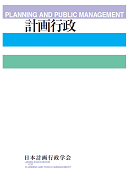Volume 46, Issue 4
Displaying 1-8 of 8 articles from this issue
- |<
- <
- 1
- >
- >|
Data Science and Planning Administration
Introductory Remarks
-
2023Volume 46Issue 4 Pages 1-2
Published: November 15, 2023
Released on J-STAGE: December 27, 2023
Download PDF (496K)
Special Articles
-
2023Volume 46Issue 4 Pages 3-8
Published: November 15, 2023
Released on J-STAGE: December 27, 2023
Download PDF (880K) -
2023Volume 46Issue 4 Pages 9-14
Published: November 15, 2023
Released on J-STAGE: December 27, 2023
Download PDF (1086K) -
2023Volume 46Issue 4 Pages 15-20
Published: November 15, 2023
Released on J-STAGE: December 27, 2023
Download PDF (1873K) -
2023Volume 46Issue 4 Pages 21-26
Published: November 15, 2023
Released on J-STAGE: December 27, 2023
Download PDF (359K) -
2023Volume 46Issue 4 Pages 27-32
Published: November 15, 2023
Released on J-STAGE: December 27, 2023
Download PDF (582K)
Symposium
-
2023Volume 46Issue 4 Pages 33-41
Published: November 15, 2023
Released on J-STAGE: December 27, 2023
Download PDF (438K)
Local and Regional Planning
-
2023Volume 46Issue 4 Pages 42-45
Published: November 15, 2023
Released on J-STAGE: December 27, 2023
Download PDF (1620K)
- |<
- <
- 1
- >
- >|
